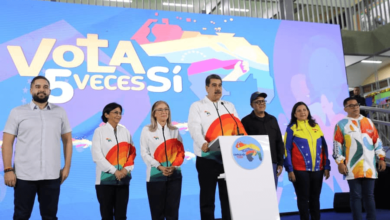Uruguay
|
He was a founder of the leftist Broad Front of Uruguay in 1971. The organization was declared illegal in the aftermath of a 1973 military coup, and Benedetti had to flee into exile.
Beneditti first made his way to Argentina, but Argentinean military repression forced him to move to Peru. The 1970s were a time of brutal military dictatorships throughout Latin America and, following his arrest in Peru, he sought refuge once more—this time in Cuba.
Benedetti was one of the most widely-read Latin American writers, composing 80 novels, hundreds of poems and numerous essays. Benedetti wrote prolifically on a broad range of themes. Among his works was the Uruguayan political journal Marcha, which was shut down in 1973.
Despite the turmoil of exile, Benedetti always spoke in favor of Latin American struggles, including strong support for Cuba’s revolution and Puerto Rican independence.
Among the many eulogies issued, La Casa de las Americas, an esteemed literary institution in Cuba, stated: “His convictions propelled him into exile (a good part of which took place in Havana) and to defend his ideas—which we shared as well—in any forum where he was present. Persecuted for his support of Cuba, he never let up for a moment his support for a Revolution which he considered his own.”
Peru
Protests and occupations by Indigenous communities are continuing against the government of Alan García. Indigenous peoples are demanding the overturn of several laws signed by the Peruvian president in 2008 that allow for massive corporate development on Indigenous land.
The government stepped up its repression and declared a state of emergency in early May, banning public gatherings and permitting unrestricted police searches.
The U.S.-Peru Trade Promotion Agreement went into effect on Feb. 1. It contains highly destructive provisions similar to the North American Free Trade Agreement. NAFTA has devastated Mexico’s economy since its launch in 1994.
With the PTPA, fully 80 percent of U.S. consumer and industrial goods imported into Peru are now duty-free, as well as two-thirds of U.S. farm products.
The government of Alan García has been actively supporting the Venezuelan right-wing opposition by granting asylum to several of its leaders. The latest was Manuel Rosales, mayor of Maracaibo, who was given asylum April 28.
Rosales was facing corruption charges in Venezuela, and he is now claiming to be a victim of political persecution. Rosales was an active participant in the coup attempt against Venezuelan president Hugo Chávez.
Cuba
Havana commemorated the International Day Against Homophobia on May 17 with workshop panels, book and literature promotion, and a short parade down the capital city’s main street, La Rampa.
Among those in attendance were Ricardo Alarcón, president of Cuba’s National Assembly of People’s Power; Yolanda Ferrer, general secretary of the Cuban Women’s Federation; and Mariela Castro, director of Cuba’s National Center of Sex Education.
According to news agency Prensa Latina, Castro explained the importance of the day for Cuba: “This celebration is part of a wider education strategy to raise awareness about respecting free and responsible sexual orientation and gender identity. Homosexuals are not a problem, homophobia is.”







